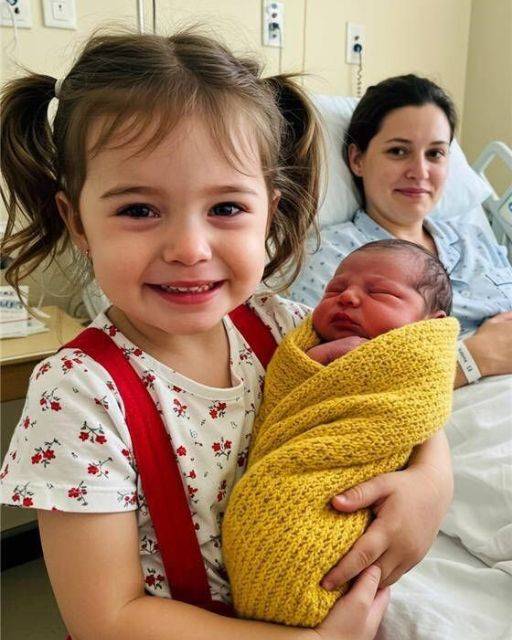She smiled so wide her cheeks looked ready to burst, her small hands cradling her newborn sister as if she had practiced this moment for years. The yellow blanket clashed with her red suspenders, but she didn’t care. From my hospital bed, exhausted, stitched, and running high on postpartum hormones, I watched my firstborn, Lina, beam with pride.

For four years she had been an only child, kissing my belly each night and asking every morning if her sister had arrived yet. Now Elsie was here, and I thought everything would be fine. Lina leaned in close to her sister’s face, her voice almost a whisper, and said, “Now I have someone to keep the secrets with.” My heart skipped. “Secrets?” I asked. She nodded, still grinning. “Like the ones I don’t tell Dad. It’s okay. She won’t say either.” I laughed nervously, saying babies can’t talk yet, and asked what kind of secrets she meant, but she dodged the question, hopped off the chair, and asked for a cookie. I brushed it off as odd child talk—Lina was imaginative, after all. She once invented a dragon named Toffee and thought clouds were God’s pillows.
I didn’t tell my husband James that night; he had enough on his plate. For the first couple of months, Lina was the perfect big sister—fetching diapers, singing lullabies, and shushing her toys so Elsie could nap. She never mentioned secrets again until a rainy Tuesday when I overheard her, back turned to me, telling her dolls, “We don’t tell Daddy. That’s the rule.” When I asked why, she startled, insisting it was just doll talk, and quickly left the room. I told James that night. He laughed it off, saying it was probably about cookies or skipping tooth-brushing, but the knot in my stomach remained. A week later, I heard her in the backyard talking to Elsie: “Remember, if Daddy asks, we say the monster only comes when he’s not home.” My blood ran cold.
I asked her about the monster, and she claimed it was just pretend—a tall, shadowy figure with no face that banged on windows or hid in the kitchen. “Elsie sees it too,” she added. That night I barely slept. James worked late two nights a week, and I couldn’t shake the whispers from my mind. I started asking Lina casual questions about strange noises or games she played when I wasn’t around, but she either gave silly answers or avoided the topic. I installed a baby monitor in the hallway with night vision. James thought I was being overprotective—until three nights later when, at 11 p.m., I saw Lina on the monitor, standing silently outside our bedroom door for nearly ten minutes before turning back to her room. The next morning she denied it completely.
Searching her room that night, I found a folded drawing under her pillow—a tall, faceless black figure behind our kitchen table, next to two small figures in red and yellow. Beneath it, in shaky letters: “Don’t let him take her.” I showed James, and his face went pale. We agreed to see a child psychologist, but we never made it. Three days later, Lina vanished. One moment she was dancing with her stuffed duck in the hallway; fifteen minutes later, the house was silent. Doors locked, backyard gate closed. Panic set in, police were called, neighbors searched. Four hours later, James found her in the shed, holding Elsie.
When I asked why she’d hidden her sister, she said, “The monster said he was coming. He told me I could give him Elsie instead.” I asked if someone had come into the house; she shook her head. “He doesn’t need doors.” The psychologist later said Lina was bright and creative but showed signs of anxiety and possible trauma. When I gently asked if the monster was someone she knew, she said, “He smells like Daddy. Sometimes he sounds like him when he shouts at the TV or slams the door.” That night I confronted James. He broke down, admitting he had started drinking during my pregnancy and sometimes lost his temper when I wasn’t home, yelling at Lina and once grabbing her too hard. She had turned her fear into a monster.
James left that night and began treatment, as did Lina. Slowly, painfully, things improved. Lina stopped whispering to Elsie and drawing faceless figures. She laughed again. James stayed sober, seeing her on supervised visits. Months later, as I tucked her in, she looked at me and said, “I don’t need to keep secrets anymore.” My heart broke and healed in the same breath. Sometimes the monsters aren’t under the bed—they’re people we love. People can change, but children should never have to live with secrets.





